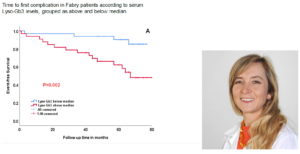Fabry disease (FD) is a rare X-linked lysosomal storage disease caused by mutations in the α-galactosidase A gene (GLA) leading to enzymatic deficiency of α-galactosidase A and ultimately in progressive glycosphingolipid accumulation, especially globotriaosylceramide (Gb3) and its deacylated derivative globotriaosylsphingosine (Lyso-Gb3).
The major metabolite of FD plasma Lyso-Gb3 appears as a potential marker of disease progression and is associated with increased risk of mortality and other significant clinical events. The cumulative pretreatment exposure to Lyso-Gb3 seems to worsen the long-term clinical outcomes, while the disease-specific treatment should ameliorate cumulative toxic Lyso-Gb3 effects. (By Dr. Albina Nowak, https://jmg.bmj.com/content/early/2021/01/24/jmedgenet-2020-107338 )
Lyso-Gb3 associates with adverse long-term outcome in patients with Fabry disease
(Visited 475 times, 1 visits today)
